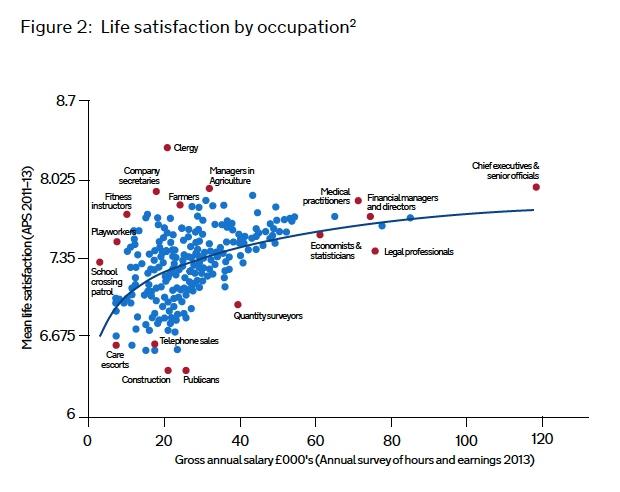 Does increasing income make you happier?
Does increasing income make you happier?
In 1974, Richard Easterlin observed that decades of substantial, real income growth in the United States had not led to corresponding growth in happiness levels. The Easterlin Paradox, or Happiness Paradox, has been documented in the UK and more than three dozen countries throughout the globe, including developed and developing nations, those in transition to market economies.
Studies within countries find that wealthier people tend to be happier than poor people. Yet studies that compare countries, or look at a single country over a period of time find very little, if any, relationship between increases in per capita income and average happiness levels. On average, wealthier countries are happier than poor ones; happiness seems to rise with income up to a point, but not beyond it
The Office of National Statistics (ONS) have produced some research in 2014 related to this. Part of this research looked at the levels of life satisfaction for people in different jobs, plotted against typical earnings to see if there was a correlation between income and life satisfaction - see figure 2 below.

While highly-paid Chief Executives and senior officials do well, take-home pay doesn’t seem to be the only important factor. Occupations like publicans and members of the clergy, which have similar income levels, seem to have very different levels of wellbeing.
At an individual level, research tells us much about this. It has been estimated that between a fifth and a quarter of the variation in overall life satisfaction amongst employed people is explained by being in work. And it is fairly widely known that people are happier at work when they feel engaged with what they do, when they like and trust their managers, when they have secure and interesting work, and when they have some autonomy in how they do it.
The University of Warwick have recently authored a study 'Understanding Happiness' published by The Social Market Foundation. Many interesting observations were made. Here are just a few:
Happier workers were more productive. In experiments, university students were paid to add five-digit numbers under time pressure. The students were paid for each correct answer. Students were either offered nothing or watched a comedy movie clip or received chocolate, fruit and drinks before undertaking the work. Productivity was substantially higher among those who watched the comedy clip, and among those who were offered food and drinks. Those who reported the largest happiness boost from the movie or food and drinks were the most productive. Students in the ‘happier’ groups were approximately 12 percent more productive.
[Question to consider - all work and no play makes... How can you use this in the workplace? Note a comedy film has less calories than chocolate!]
There is evidence of a paradox: the happiest places tend to have the highest suicide rates. The evidence for this ‘dark contrasts’ paradox comes from analysis of well-being data and suicide rates in Western nations, and states within the United States. No one knows exactly why this is the case, but the authors believe that unhappy people in a happy place may feel particularly harshly treated by life. Those dark contrasts may, in turn, increase the risk of suicide. This finding is reminiscent of earlier research that found that suicide rates by the unemployed seem to be higher in low-unemployment regions.
[Question to consider - does growing inequality heighten the dark contrast?]
Human happiness follows a U-shaped curve over the course of our lifetimes. Happiness is generally high in youth. It falls to a nadir in middle age, when suicide risk and antidepressant use are greatest. Happiness levels then rise again in old age. This appears to be a universal experience. The U-shaped curve has been found among the populations of 72 countries. The pattern emerges regardless of one’s economic or social circumstances. Men and women, single and married people, rich and poor, and those with and without children all experience this same pattern with a slump in mid-life.
[Question to consider - are people searching for purpose and meaning to life in a mid-life stage?]
Research of 6 years' data from food diaries for a random sample of more than 12,000 adults found that increased fruit and vegetable consumption was predictive of increased happiness, life satisfaction and well-being. Taking into account changing incomes and personal circumstances that might affect happiness, etc., the life-satisfaction boost from an increase of eight portions of fruit and vegetables per day provided a psychological gain equal to moving from unemployment to employment. Improvements occurred within 24 months – too quickly to be a reflection of the physical advantages of diet for outcomes such as heart disease.
[Question to consider - would the cost of this food be a barrier to the poor?]
Happiness is contagious. The findings show that whether an individual is happy depends in part on whether others in the individual’s social network are happy. Happiness, thus, is a ‘network phenomenon’ that clusters in groups of people. This happiness spreads among networks that extend up to three degrees of separation – for example, to one’s friends’ friends’ friends.
[Question to consider - how do Christians communicate?]
There is also an analysis of happiness from 1771 to 2009 by country by analysing words used in 8 million books and other sources published over that time in various languages. The UK is in the appendix at the end of the report (Page 116).
Key findings:
-
There is no connection between economic growth and the state of human happiness in the long run. .
-
Growth of GDP does not play a significant role in a nation’s happiness, but economic instability and recessions lead to plummeting levels of well-being.
-
Wars and civil conflict lead life satisfaction to plummet.
-
Increases in life expectancy and decreases in rates of child mortality coincide with increased levels of happiness.
-
Words matter - the vocabulary in publications mirrors the public mood.
-
Freedom of speech – or the lack thereof – plays an important role. Censorship affects public perception.
A reminder - churches can run The Happiness Course which starts attendees talking and thinking about what makes for happiness. It is examines the faith dimension as well.
Retweet about this article:
Geoff Knott, 28/03/2017